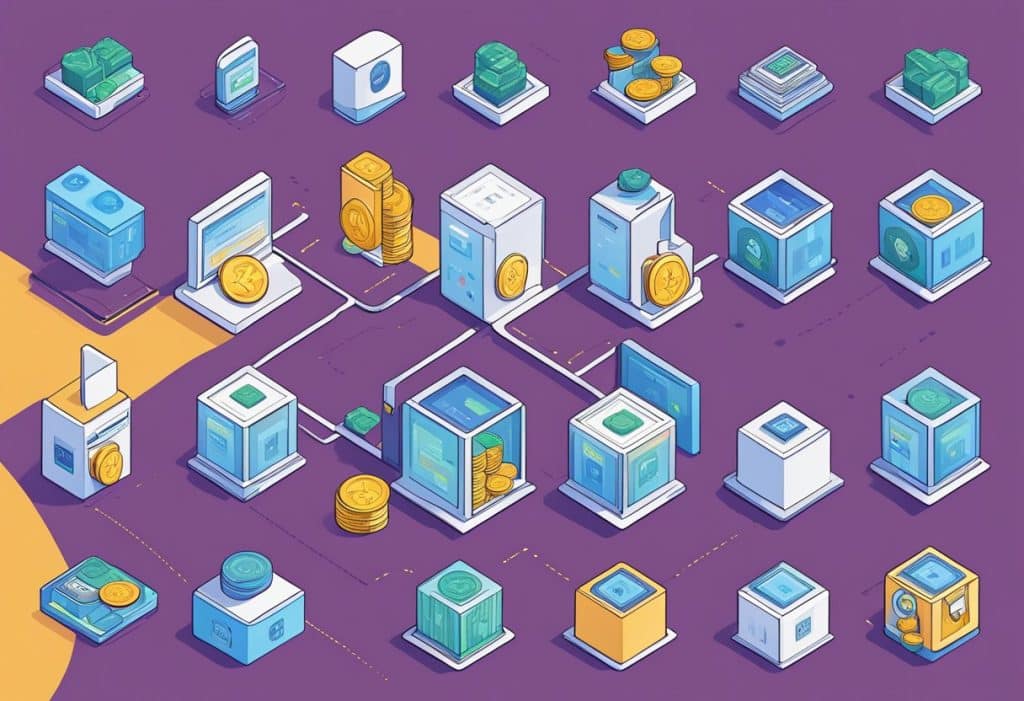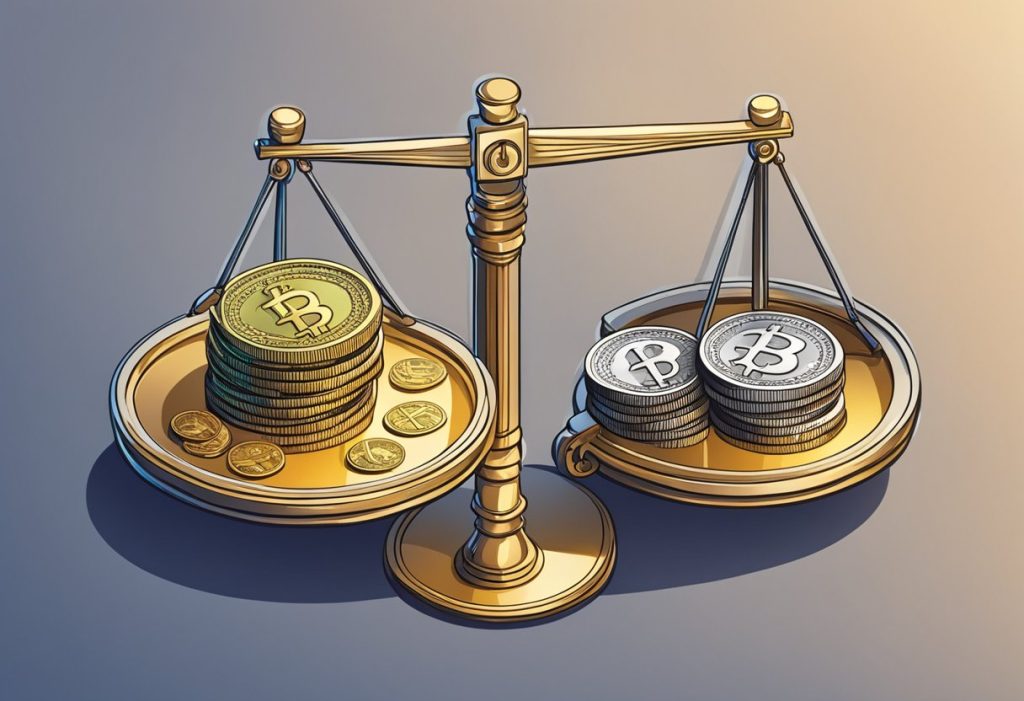When exploring the realm of cryptocurrency exchanges, two prominent names often dominate the conversation: Coinbase and Kraken. Both platforms offer a gateway into the world of digital assets, providing tools for buying, selling, and managing a diverse portfolio of cryptocurrencies. Coinbase, renowned for its user-friendly interface, caters to a broad audience ranging from beginners to advanced traders. On the other hand, Kraken appeals to a more diverse user base with its comprehensive suite of trading features and lower fee structure.

Each exchange stands out for unique reasons. Coinbase is well-known for its straightforward design, making it accessible for those new to cryptocurrency, while Kraken boasts strong advantages in the form of lower fees and a wider range of currencies and tools tailored for more experienced traders. As you consider which platform is better suited to your needs, it is essential to weigh factors such as fee structures, security measures, available cryptocurrencies, and ease of use.
Key Takeaways
- Coinbase and Kraken are leading cryptocurrency exchanges with distinctive features suitable for different types of users.
- Consideration of fee structures, security, and supported assets is crucial when choosing between Coinbase and Kraken.
- User experience differs significantly between the two platforms, affecting the ease with which you can manage your funds and execute trades.
Overview of Coinbase and Kraken

Coinbase and Kraken are two globally recognized crypto exchanges, offering a platform for buying, selling, and trading a variety of cryptocurrencies.
History
Coinbase, founded in June 2012 by Brian Armstrong and Fred Ehrsam, quickly rose to prominence as a user-friendly platform, especially for those new to cryptocurrencies. Its headquarters are in San Francisco, USA. Kraken, established in 2011 by Jesse Powell, is also based out of San Francisco, and is known for its strong security and extensive range of trading features for both beginners and experienced traders.
Market Position
As significant players in the cryptocurrency market, both Coinbase and Kraken have solidified their positions with distinct offerings. Coinbase is renowned for its intuitive interface and is often the first choice for beginning crypto investors. Kraken, while also suitable for newcomers, is popular among experienced traders for its lower fee structure and comprehensive set of tools.
| Feature | Coinbase | Kraken |
|---|---|---|
| Founded | 2012 | 2011 |
| Headquarters | San Francisco, USA | San Francisco, USA |
| Interface | User-friendly for beginners | Friendly for all levels |
| Fees | Higher for casual users | Lower, favored by traders |
| Tools | Basic and advanced options | Extensive trading features |
Comparative Analysis
In comparing Kraken and Coinbase, you’ll discover distinct differences in their security features, range of services, and fee structures. These factors are pivotal in deciding which platform suits your cryptocurrency trading needs best.
Security Features
Kraken and Coinbase both prioritize the security of your funds and personal information. Kraken offers features like two-factor authentication (2FA), a global settings lock, and PGP/GPG for email encryption. Coinbase, similarly, provides 2FA, biometric fingerprint logins, and also stores 98% of customer funds offline to protect against theft.
Range of Services
When evaluating services, you’ll notice that Coinbase is user-friendly, targeting both beginners and experienced traders with services like Coinbase and Coinbase Pro. Kraken offers a similar range, catering to beginners with simple buy/sell options and to professionals with Kraken Pro, which includes advanced charting and trading features. Both exchanges offer a variety of cryptocurrencies for trading.
Fee Structure
For fees, both exchanges implement a maker-taker model:
| Fee Type | Kraken | Coinbase |
|---|---|---|
| Maker Fee | 0.16% starting | 0.50% max |
| Taker Fee | 0.26% starting | 0.50% max |
| Instant Buy/Sell | 1.5% (varies by payment method and currency) | Up to 2.99% (varies by transaction size) |
Kraken generally offers lower fees than Coinbase, especially for those who trade higher volumes. Both exchanges reduce fees as your 30-day trade volume increases, but Kraken’s fee reduction thresholds are typically more favorable to high-frequency traders.
Account Management and User Experience

When choosing between Kraken and Coinbase, you should consider how each platform handles account setup, ease of use, and customer support as these directly impact your daily interactions and long-term satisfaction.
Account Setup
To start trading on Coinbase or Kraken, you need to create an account, which typically involves providing personal information due to Know Your Customer (KYC) regulations. Coinbase offers a speedy sign-up process by linking your account through Plaid’s data transfer network. On the other hand, Kraken requires a standard email and password setup.
- Coinbase
- Speed: Rapid
- KYC: Required
- Method: Plaid for account linking
- Kraken
- Speed: Moderate
- KYC: Required
- Method: Email and password
Verification times may vary, but both platforms are generally efficient, completing the process within a few days.
Ease of Use
When it comes to navigating the platforms, your experience can vary. Coinbase is known for its intuitive user interface, aimed at beginners in the crypto space, making it easier for you to understand and use its features. Kraken has a more complex interface that might appeal to you if you have some experience with crypto trading.
- Coinbase: Intuitive, great for beginners
- Kraken: Advanced, preferred by seasoned users
The search functionality within Coinbase enables easy access to all of its platform features, while Kraken also strives for user-friendliness with a robust support center to guide you through its offerings.
Customer Support
Customer support is vital for resolving issues and guiding you through various processes. Both Coinbase and Kraken offer support tickets and have extensive FAQs and help centers.
- Coinbase: Extensive Help Center, email support
- Kraken: Detailed FAQs, 24/7 live chat support
Kraken stands out with its 24/7 live chat support, a feature that you may find particularly valuable when you need real-time assistance.
Trading and Investment Services

When it comes to trading and investment services, you’ll want to choose a platform that aligns with your needs for trading efficiency and investment variety. Understand the platforms’ capabilities, what you can invest in, and the mechanics of funding and withdrawals before selecting your ideal crypto exchange partner.
Trading Platforms
Coinbase Pro and Kraken Pro are the advanced trading platforms offered by Coinbase and Kraken respectively. Both platforms provide you with a more sophisticated trading experience, offering detailed charts, various order types, and lower fees than their standard services. Kraken Pro boasts lower fee structures, starting at a max of 0.26%, as opposed to Coinbase Pro’s higher fees beginning at 0.50%. Coinbase Pro simplifies your trading with a user-friendly interface while Kraken Pro might appeal to you if you are looking for a more cost-efficient option with robust trading features.
Investment Options
Both platforms offer you an array of investment options in the form of different cryptocurrencies. Your choice for crypto investing may be influenced by the availability of certain coins on each platform. Kraken generally provides a wider selection of coins and trading pairs than Coinbase, which could be beneficial if you’re seeking specific or less common cryptocurrencies. It’s important to note that investment choices on both platforms can change as they frequently update their listings based on market and regulatory developments.
Funding and Withdrawal
The deposit and withdrawal process is vital for a smooth investment journey. Coinbase and Kraken both support various deposit methods including bank transfers, wire transfers, and for some locations, debit cards or credit cards. Kraken allows for more diverse fiat currencies to be deposited directly, which may provide you with greater flexibility if you hold funds in multiple currencies.
| Feature | Coinbase Pro | Kraken Pro |
|---|---|---|
| Deposit Options | Bank transfers, Wire transfers, Debit/Credit Cards (limited regions) | Bank transfers, Wire transfers, Multiple fiat currencies |
| Withdrawal Options | Bank transfers, PayPal (limited regions), Crypto | Bank transfers, Crypto |
| Deposit Fees | Vary by region and method | Typically lower, varies by method and currency |
| Withdrawal Fees | Vary by region and method | Typically lower, varies by method and currency |
Kraken Pro might offer you a cost advantage with typically lower withdrawal fees. Both platforms enable cryptocurrency withdrawals, which can be a convenient option if you want to transfer assets to private wallets or other exchanges.
Security and Insurance

When choosing a cryptocurrency exchange, the security of your funds and personal information is paramount, as is how well your investments are protected through insurance policies.
Security Measures
Kraken and Coinbase both prioritize the security of your assets through a series of stringent measures. They employ two-factor authentication (2FA), which adds an extra layer of security at login. This can include anything from SMS verification to more secure methods like using an authenticator app or security keys.
Cold storage is a critical feature where a majority of your digital assets are held. Both exchanges keep the vast majority of their customers’ funds offline to safeguard them from online breaches.
In terms of encryption, your digital wallets with Coinbase are protected by AES-256 encryption—one of the strongest block ciphers available.
Insurance Policies
When it comes to insurance policies, there is a notable difference between the two platforms:
| Feature | Kraken | Coinbase |
|---|---|---|
| Insurance for Breaches | Information not explicitly detailed in search results | Insured in the event of a data breach |
| FDIC-insured USD | Information not explicitly detailed in search results | USD balances are insured up to $250,000 per customer by the FDIC |
| Additional Layers | Offers robust security features, but fewer insurance layers compared to its competitor | Multiple layers of insurance, providing slightly more protection policies |
Ultimately, your choice depends on what level of security and insurance gives you the most confidence. Both Kraken and Coinbase have maintained strong security records, with Coinbase reporting a minor incident affecting users in October 2021. However, both have shown resilience against the ongoing threats in the crypto environment.
Additional Features and Rewards
When evaluating Kraken and Coinbase, understanding the unique value-added services like staking rewards, educational content, and exclusive services is essential. These features may enhance your experience and offer additional benefits beyond just trading.
Staking and Rewards
Both Kraken and Coinbase offer staking services that allow you to earn rewards by holding certain cryptocurrencies. Kraken stands out with up to 23% APY on staking, supporting a broad range of 16 assets. Coinbase provides a competitive staking option with crypto rewards but typically offers a lower APY than Kraken.
| Feature | Kraken | Coinbase |
|---|---|---|
| Staking APY | Up to 23% | Competitive, but lower than Kraken |
| Assets Offered | 16 assets | Multiple, but fewer than Kraken |
Educational Resources
Coinbase is known for providing educational materials to help users understand the complexities of cryptocurrency. By engaging with these materials, you have the opportunity to earn free crypto through their Coinbase Earn program. Kraken doesn’t offer a direct analog to Coinbase Earn but does provide various guides and informative content through their support center.
| Feature | Kraken | Coinbase |
|---|---|---|
| Resources | Guides and support center articles | Coinbase Earn program, educational content |
| Crypto Rewards | None directly linked to education | Earn crypto by learning about different coins |
Exclusive Services
For exclusive services, both exchanges offer unique options. Coinbase has the Coinbase Card, a Visa debit card that lets you spend your cryptocurrency like cash, offering rewards for its use. On the other hand, Kraken doesn’t provide a crypto card but has exclusive features for advanced traders and institutions.
| Feature | Kraken | Coinbase |
|---|---|---|
| Crypto Card | Not Available | Coinbase Card with rewards |
| Advanced Trading | Exclusive features for traders | Advanced Trade platform |
| Institutional | Services for institutions | Custodial services for institutions |
Cryptocurrency and Fiat Support
When choosing a cryptocurrency exchange, the variety of supported digital and fiat currencies can be crucial. Here’s a detailed look at how Kraken and Coinbase compare in their cryptocurrency and fiat support.
Supported Cryptocurrencies
Kraken and Coinbase provide access to a wide range of cryptocurrencies. Here’s how they stack up:
- Bitcoin (BTC): Available on both platforms.
- Ethereum (ETH), Litecoin (LTC), and Bitcoin Cash (BCH): Supported by both Coinbase and Kraken.
- Cardano (ADA) and Tron (TRX): Availability can vary, with Coinbase generally offering a broader range but Kraken also supporting a diverse selection, including Tron.
- Stablecoins: Both exchanges list popular stablecoins like USD Tether (USDT), with Kraken offering additional options.
Fiat Currency Options
Your ability to fund your account with fiat money is important for trading. Both platforms support various major fiat currencies for deposits and withdrawals:
- USD (U.S. Dollar): Fully supported on Kraken and Coinbase.
- EUR (Euro): Accessible on both, reflecting their wide usability in the crypto market.
- AUD (Australian Dollar), CAD (Canadian Dollar), GBP (British Pound), JPY (Japanese Yen), and CHF (Swiss Franc): Kraken often provides more direct trading pairs with these currencies than Coinbase.
Mobile and Web Platforms
Both Kraken and Coinbase offer user-friendly mobile apps and web platforms, facilitating trading on the go as well as from a desktop environment. Your choice between the two may depend on your trading style and experience level.
Coinbase provides a straightforward interface designed for beginners, making it easier for you to navigate and manage your digital wallet. Their mobile app is highly rated and offers the convenience of a crypto wallet where you can store a wide range of cryptocurrencies.
On the other hand, Kraken has a platform that caters to both beginners and experienced traders. Kraken’s mobile app allows you to perform trades and monitor your account with efficiency, although some users find the interface less intuitive compared to Coinbase’s app.
If you’re looking to make decisions based on trading volume data, both platforms provide this information, but Kraken’s interface might be preferred by traders who require more comprehensive analytics.
As for the security of your funds, both platforms offer a coinbase wallet, ensuring that your cryptos are safeguarded in a secure environment.
Here is a brief comparison:
| Feature | Coinbase | Kraken |
|---|---|---|
| Mobile App | User-friendly | Advanced features |
| Web Platform | Simplified for ease | Detailed for traders |
| Digital Wallet | Included | Included |
| Trading Volume | Displayed | Displayed |
| Crypto Wallet | Integrated | Integrated |
Choosing between Coinbase and Kraken will hinge on your individual needs for convenience, ease of use, and tools for market analysis.
Regulatory Compliance and Security
When comparing Coinbase and Kraken in terms of regulatory compliance and security, you should consider the following aspects:
- Securities and Exchange Commission (SEC) Interaction: Coinbase has publicly sought clearer regulations from the SEC while responding to actions taken against other entities, such as Kraken. The SEC charged Kraken for failing to register its crypto asset staking-as-a-service program, reflecting strict enforcement of securities laws.
- Regulatory Compliance: Both platforms operate in the United States and are therefore subject to the US’s rigorous financial regulations. Coinbase especially has been vocal about the need for regulatory clarity to continue operating effectively.
- Security Protocols: Both Coinbase and Kraken prioritize security, employing SSL encryption to protect your data. Their security measures include two-factor authentication and wallet and system security to ensure the safety of your assets.
- Security Breaches: It’s critical to know how each exchange responds to and safeguards against potential security breaches. Regular audits and user account surveillance are part of their commitment to maintaining trust.
Below is a summarized comparison of relevant security features:
| Feature | Coinbase | Kraken |
|---|---|---|
| SSL Encryption | Yes | Yes |
| Two-Factor Authentication (2FA) | Yes | Yes |
| Public Engagement with SEC | Yes, advocates for clear regulatory frameworks | Yes, subject to SEC actions for compliance |
| User Asset Surveillance | Coinbase monitors accounts for suspicious activities | Kraken has faced criticisms for mixing client assets |
Your choice between the two should weigh these considerations according to your personal preference for regulatory engagement and security infrastructure.
Costs and Pricing
When evaluating Coinbase and Kraken, understanding their costs and pricing structures for trading activities is crucial. Each platform has unique pricing models, including commission, fees, and specific charges for maker-taker transactions.
Coinbase utilizes a maker-taker model, alongside a percentage spread for trades and a transaction fee that varies depending on the amount you are trading. The standard fees are:
- Spread: Approximately 0.50% per trade
- Coinbase Fee: Ranges from $0.99 to $2.99 based on the transaction value
- Coinbase Pro: Maker fees start at 0.4%; taker fees start at 0.6%
Kraken, on the other hand, offers a tiered fee structure, emphasizing lower costs for higher trade volumes. Their fees are:
- Trading Fees: Ranging from 0.0% to 0.26% based on maker-taker status and 30-day trade volume
- Instant Buy: 1.5% for digital assets; 0.9% for stablecoin trades
Below is a simplified table summarizing the trading fees:
| Service | Coinbase Trading Fee | Kraken Trading Fee |
|---|---|---|
| Standard Trade | 0.50% spread | 0.0% – 0.26% |
| Instant Buy | N/A | Digital: 1.5%, Stablecoin: 0.9% |
| Maker Fee (Pro) | Starts at 0.4% | Starts at 0.0% |
| Taker Fee (Pro) | Starts at 0.6% | Starts at 0.26% |
Remember that additional costs may apply when you use credit or debit cards for your transactions, and these are considerably higher for instant buying options. By comparing these fees, you can identify which platform aligns better with your trading habits and volume.
Advanced Trading Features

When examining advanced trading features, both Coinbase and Kraken provide a range of tools designed for experienced traders. Coinbase Advanced Trade allows you to engage in trading activities with detailed charting and an intuitive interface. The fees start with maker and taker fees of 0.6% and 0.4% respectively, decreasing as your trading volume increases.
Kraken, on the other hand, offers a comprehensive suite of trading options including margin trading with up to 5x leverage and a variety of futures trading products. Its fees are generally lower, with a maker-taker model that can go as low as 0.02% and 0.05%, depending on the volume traded over a 30-day period.
Here is a brief comparison of the key features:
| Feature | Coinbase | Kraken |
|---|---|---|
| Margin Trading | Up to 3x Leverage | Up to 5x Leverage |
| Futures Trading | Not Directly Available | Available |
| Fee Structure | 0.6%/0.4% (Maker/Taker) | 0.02%/0.05% (Maker/Taker) |
| Interface | Advanced Trade platform | Cryptowatch & Kraken Pro |
With Cryptowatch, Kraken also allows you to analyze markets, manage trades, and stay synced with your account for a seamless trading experience.
As you consider the advanced features for your trading strategies, weigh the cost structure, the availability of leverage, and trading options like futures to select the platform that aligns with your trading needs and expertise.
Funding and Payment Options
When you’re looking to choose between Kraken and Coinbase for your cryptocurrency needs, understanding the differences in their funding and payment options is crucial for a streamlined experience.
Kraken offers a range of funding options. You can fund your account using:
- Bank transfers (including SWIFT, SEPA, and domestic)
- Cryptocurrency deposits
For withdrawals, similar methods apply, and Kraken supports withdrawal in USD. However, Kraken does not support PayPal for either deposits or withdrawals.
Coinbase, on the other hand, provides you with these funding and payment features:
- Bank transfers (including ACH in the USA)
- Debit and credit card purchases
- PayPal (for both deposits and withdrawals)
- Cryptocurrency deposits and withdrawals
Both platforms allow you to deposit and withdraw in USD.
Below is a brief comparison of funding and payment options for Kraken and Coinbase:
| Feature | Kraken | Coinbase |
|---|---|---|
| Bank Transfer | Yes (SWIFT, SEPA, domestic) | Yes (ACH, etc.) |
| Debit/Credit Card | Yes | Yes |
| PayPal | No | Yes (for both deposit & withdrawal) |
| Crypto Deposit/Withdraw | Yes | Yes |
| USD Deposit/Withdraw | Yes | Yes |
When sending or receiving funds, both exchanges provide easy-to-use interfaces that guide you through the process, ensuring you can move your funds as needed with confidence. Remember to review the fees associated with each method on the respective platform, as this can impact the total cost of your transactions.
Comparison Summary

When considering Kraken vs. Coinbase, your choice hinges on specific attributes like fees, ease of use, and the services offered. This section will outline their comparative strengths and weaknesses and provide a succinct recommendation based on these aspects.
Pros and Cons
Kraken
- Pros:
- Lower transaction fees, with a maximum of 0.26%.
- A more diverse range of features catering to professional traders.
- Cons:
- Interface may be complex for beginners.
- Customer service experiences vary among users.
Coinbase
- Pros:
- Highly intuitive interface suitable for new investors.
- Generally considered reliable with a strong track record.
- Cons:
- Higher transaction fees, up to 0.50%.
- Advanced features require additional fees.
In comparing both, you’ll notice that Kraken might be more cost-effective if you trade large volumes, while Coinbase shines in its user-friendly approach.
Final Recommendation
If you are just starting out or prefer a more navigable user experience, Coinbase may be the better choice for you. Its straightforward platform is designed with your ease of use in mind, though it comes at a higher cost. Conversely, if you are serious about trading and are looking for lower fees and a suite of advanced trading tools, Kraken is likely to be more suitable. Its platform is built to serve the needs of pro traders, offering a robust set of features that might overwhelm new investors. Consider what is most important for your trading strategy and experience level when making your decision.
Company Insights
In this section, you’ll gain insight into the leadership and innovation behind two prominent cryptocurrency exchanges, Coinbase and Kraken, to better understand their strategic directions and contributions to the industry.
Leadership
Coinbase, a leading cryptocurrency exchange in the United States, was co-founded by Brian Armstrong and Fred Ehrsam. Armstrong, serving as the CEO, has spearheaded Coinbase’s expansion and solidified its reputation as a trusted platform for buying, selling, and storing digital assets. Through Armstrong’s leadership, Coinbase has focused on regulatory compliance and mainstream adoption of cryptocurrencies.
On the other side, Kraken was founded by Jesse Powell, who has been an advocate for cryptocurrency standardization and security. Powell, as the CEO, has guided Kraken in building a reputation for strong security measures and a comprehensive approach to banking relationships, allowing it a global footprint in the cryptocurrency market.
Innovation
When you look into the research and development arms of both companies, it becomes apparent that innovation is a core tenet for both. Coinbase boasts of a sophisticated platform that has simplified the process of investing and participating in the cryptocurrency space. They continuously work on developing new features aimed at increasing accessibility for both novice and experienced traders.
Kraken, contrastingly, focuses on providing an extensive suite of trading tools for more experienced traders. They continually enhance their security measures and have been pioneers in creating a transparent and methodical process for coin listings and contributions to cryptocurrency research and security standards.
Below is a table highlighting some specifics of each company’s innovative contributions:
| Feature/Contribution | Coinbase | Kraken |
|---|---|---|
| Trading Tools | User-friendly interface | Advanced tools for experienced traders |
| Security Enhancements | Emphasis on regulatory compliance and secure storage | Robust security protocols, early adoption of comprehensive security measures |
| Accessibility | Efforts to simplify participation in crypto markets | Services aimed at global market penetration |
| Research | Extensive market and investment research offerings | Contributions to industry security standards |
By staying informed about the leadership and innovative efforts of Coinbase and Kraken, you can make more educated decisions regarding which platform aligns better with your trading standards and investment philosophy.
Frequently Asked Questions
In this section, you’ll find answers to common questions about the differences between Coinbase and Kraken, including fees, security, accessibility, and unique features that each platform offers.
What are the key differences in withdrawal fees between Coinbase and Kraken?
Coinbase typically charges a fee based on the withdrawal method and network fees, which can vary. On the other hand, Kraken’s withdrawal fees are different for each cryptocurrency, but they tend to be lower than Coinbase for most coins.
Which platform is considered safer for trading, Coinbase or Kraken?
Both Coinbase and Kraken are known for their strong security measures, including cold storage for customer assets and robust compliance protocols. However, Coinbase is larger and has a slightly longer track record, often leading to the perception of being more secure.
Is Kraken accessible to American users for cryptocurrency trading?
Yes, Kraken is accessible to American users and complies with local regulations. However, certain features and assets may be restricted depending on specific state regulations within the US.
What advantages does Coinbase offer over Kraken?
Coinbase offers a very user-friendly experience, making it accessible to beginners. It also provides educational resources to help new investors understand cryptocurrency trading. Additionally, Coinbase features Coinbase Earn, enabling users to earn crypto while learning about new currencies.
What reasons might users have for not choosing to use Kraken for crypto exchanges?
Some users might prefer not to trade on Kraken because of its more complex interface, which can be challenging for beginners. Others might find that Kraken has fewer payment method options compared to Coinbase. It is also worth considering that Kraken’s features tailored for advanced traders might not meet the needs of casual investors.
